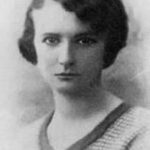Poems by Antonia Pozzi
Translated from the Italian by Amy Newman
The Dolomites
Not mountains, these pale spires,
but souls of mountains, stiffened
in the shape of their desire to ascend. And we crawl
on the unknowable firmness: palm to palm,
with arching tension in our fingers,
with the flat grip of our limbs,
we gain on the rock; with the hunger
of predators, we hoist our soft bodies
on the stone; drunk with the immensity,
we raise above the bristling summit
our ardent frailty.
Down below,
the hard rock weeps.
From dark crevices, cold clear tears pour
in droplets, and immediately disappear
under the crumbling stones. But, all around,
a blue bloom of forget-me-nots
reveals the dew, and one hears
a distant lament, like the restrained,
incessant sobbing of the earth.
Madonna di Campiglio, 13 August 1929
Dolomiti
Non monti, anime di monti sono
queste pallide guglie, irrigidite
in volontà d’ascesa. E noi strisciamo
sull’ignota fermezza: a palmo a palmo,
con l’arcuata tensione delle dita,
con la piatta aderenza delle membra,
guadagnamo la roccia; con la fame
dei predatori, issiamo sulla pietra
il nostro corpo molle; ebbri d’immenso,
inalberiamo sopra l’irta vetta
la nostra fragilezza ardente. In basso,
la roccia dura piange. Dalle nere,
profonde crepe, cola un freddo pianto
di gocce chiare: e subito sparisce
sotto i massi franati. Ma, lì intorno,
un azzurro fiorire di miosotidi
tradisce l’umidore ed un remoto
lamento s’ode, ch’è come il singhiozzo
rattenuto, incessante, della terra.
Madonna di Campiglio, 13 agosto 1929
Wild Song
I shouted for joy in the sunset.
I looked for cyclamen among the brambles:
I’d climbed to the base of a cliff
swollen and rugged, broken by bushes.
On the meadow riddled with stones,
on the blonde heads of the daisies,
on my hair, on my bare neck,
the wind whipped, from the high sky.
I shouted for joy on the way down.
I loved the bristling, wild force
that moves me to leap;
the unfamiliar, untamed force,
which stretches me like a bow, running.
The whole street smelled of cyclamen;
the meadows languished in the shadows,
still quivering with golden caresses.
Far away, in a tangle of green,
the sun lingered. I’d wanted to rush into that light;
lie down in the sun, and strip naked,
so the dying god would drink
my blood. Then at night, I’d be there,
sprawled in the meadow, my veins empty:
my withered, dead flesh
pelted with the anger of the stars.
Pasturo, July 17, 1929
Canto selvaggio
Ho gridato di gioia, nel tramonto.
Cercavo i ciclamini fra i rovai:
ero salita ai piedi di una roccia
gonfia e rugosa, rotta di cespugli.
Sul prato crivellato di macigni,
sul capo biondo delle margherite,
sui miei capelli, sul mio collo nudo,
dal cielo alto si sfaldava il vento.
Ho gridato di gioia, nel discendere.
Ho adorato la forza irta e selvaggia
che fa le mie ginocchia avide al balzo;
la forza ignota e vergine, che tende
me come un arco nella corsa certa.
Tutta la via sapeva di ciclami;
i prati illanguidivano nell’ombra,
frementi ancora di carezze d’oro.
Lontano, in un triangolo di verde,
il sole s’attardava. Avrei voluto
scattare, in uno slancio, a quella luce;
e sdraiarmi nel sole, e denudarmi,
perché il morente dio s’abbeverasse
del mio sangue. Poi restare, a notte,
stesa nel prato, con le vene vuote:
le stelle – a lapidare imbestialite
la mia carne disseccata, morta.
Pasturo, 17 luglio 1929
Philosophy
I can’t find my philosophy book anymore.
I used to pull in a little cart
a little eight month-old boy—small fry, saliva, little smile—.
Whatever was in my hands, I threw away.
The little brother of that little boy,
at the age of two, fell into a steaming boiler:
in twenty-four hours he died, atrociously.
The parish priest is sure that he became a little angel.
His mother didn’t want to go to the cemetery
to see where they’d buried him.
For peasants, mourning is immoderate luxury:
his mother doesn’t wear black.
But, when this last little boy,
with his small hands, pinches her face,
she tries her old smile:
and only manages a low laugh—a poor, muffled laugh.
Today I heard from a woman,
that mother doesn’t want to go to church anymore.
I can’t study tonight,
because I’ve mislaid my philosophy book.
Carnisio, July 7, 1929
Filosofia
Non trovo più il mio libro di filosofia.
Tiravo in carrettino
un marmocchio di otto mesi – robetta molle, saliva, sorrisino –.
Quel che m’ingombrava le mani, l’ho buttato via.
Il fratellino di quel bimbetto,
a due anni, è caduto in una caldaia d’acqua bollente:
in ventiquattro ore è morto, atrocemente.
Il parroco è sicuro che è diventato un angioletto.
La sua mamma non ha voluto andare al cimitero
“a vedere dove gliel’hanno sotterrato.
Pei contadini, il lutto è un lusso smodato:
la sua mamma non veste di nero.
Ma, quando quest’ultima creaturina,
con le manine, le pizzica il viso,
ella cerca il suo antico sorriso:
e trova soltanto un riso velato – un povero riso in sordina.
Oggi, da una donna, ho sentito
che quella mamma, in chiesa, non ci vuole più andare.
Stasera non posso studiare,
perché il libro di filosofia l’ho smarrito.
Carnisio, 7 luglio 1929

Photo: Wikipedia
Antonia Pozzi, born in Milan in 1912, lived a brief life, dying by suicide in 1938; she left behind letters, photographs, diaries, and over 300 poems; none of her poetry was published during her lifetime. Her work is significantly underrepresented in translation, and her omission from the 2004 Faber Book of 20th Century Italian Poems has been called “the most obvious lacuna” (Oliver Burckhardt, 2005). Pozzi’s poetry was posthumously altered by her father Roberto Pozzi to reshape her public image; he scrubbed any evidence of his daughter’s passion, her sense of her flawed humanity, her love affairs, and her questions of God. In 1989 editors Alessandra Cenni and Onorina Dino restored the poems to their original form in Parole, the authoritative text from which I work.
 Amy Newman is the author of five poetry collections, including Dear Editor and On This Day in Poetry History (both with Persea Books). Her translations of the poems of Antonia Pozzi appear in Poetry, Harvard Review, Bennington Review, The Arkansas International, and elsewhere; translation of Pozzi’s letters appear in Delos and Cagibi. She teaches in the Department of English at Northern Illinois University.
Amy Newman is the author of five poetry collections, including Dear Editor and On This Day in Poetry History (both with Persea Books). Her translations of the poems of Antonia Pozzi appear in Poetry, Harvard Review, Bennington Review, The Arkansas International, and elsewhere; translation of Pozzi’s letters appear in Delos and Cagibi. She teaches in the Department of English at Northern Illinois University.
The copyright for the poems of Antonia Pozzi belongs to the Carlo Cattaneo and Giulio Preti International Insubric Center for Philosophy, Epistemology, Cognitive Sciences and the History of Science and Technology of the University of Insubria, depositary and owner of the whole Archive and Library of Antonia Pozzi.
